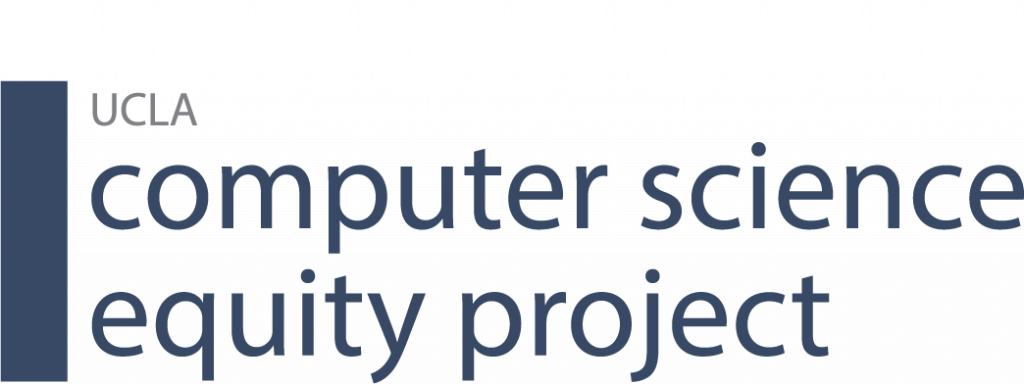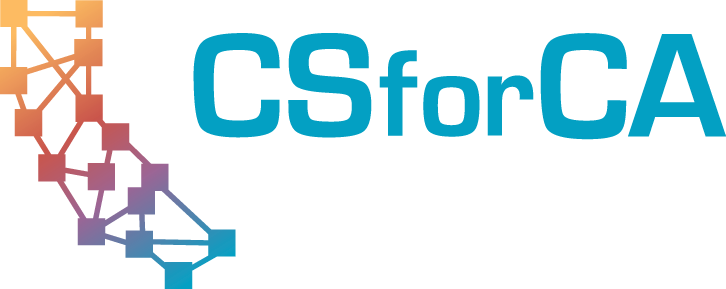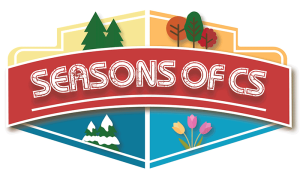Democratizing K-12 Computer Science Education
The UCLA CS Equity Project consists of several major research and policy projects focused on equity in CS K-12 education. Computer science education has too long been a window into how inequality is produced and reproduced, and how students of color, low-income, and female students become underrepresented in a field. We build and support research and programs that challenge this.
Our project attends to this production of inequality in computer science by addressing the interaction of structural inequalities (access to courses, teachers), belief systems (stereotypes about what type of student can excel in CS), classroom pedagogy, and larger educational policies that impact which students do (and which students do not) learn computer science. Additionally, as CS education begin to scale through our public K-12 school system, we work to ensure that equity is consistently kept at the center of all efforts.
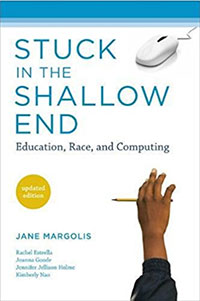 Our team has been at the forefront of broadening participation in computing activities for almost a decade now. In 2000, under the auspices of the NSF-funded “Into the Loop Alliance,” we conducted research presented in Stuck in the Shallow End: Education, Race, and Computing (Margolis, Estrella, Goode, Jellison-Holme, Nao, 2008, 2017). The findings reveal how CS educational disparities fall along race, gender, and class lines and how computer science education has been a window into the reproduction of inequality. In 2008, in response to these findings, the Exploring Computer Science (ECS) program was created and spread to the 7 largest school districts in the country. For up to date information on the ECS program, visit: www.exploringcs.org.
Our team has been at the forefront of broadening participation in computing activities for almost a decade now. In 2000, under the auspices of the NSF-funded “Into the Loop Alliance,” we conducted research presented in Stuck in the Shallow End: Education, Race, and Computing (Margolis, Estrella, Goode, Jellison-Holme, Nao, 2008, 2017). The findings reveal how CS educational disparities fall along race, gender, and class lines and how computer science education has been a window into the reproduction of inequality. In 2008, in response to these findings, the Exploring Computer Science (ECS) program was created and spread to the 7 largest school districts in the country. For up to date information on the ECS program, visit: www.exploringcs.org.
As of 2018, the Center X CS Equity Project is currently focused on Research and Policy that can strengthen the movement to democratize K-12 CS knowledge and to broaden participation in computing. See below.
PROJECTS
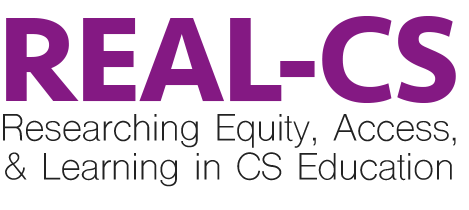
REAL-CS is a National Science Foundation collaboration between UCLA and University of Oregon partners. REAL-CS consists of three strands of work:
Strand 1 focuses on the national expansion and program support of Exploring Computer Science (ECS), led by University of Oregon.
Strand 2 focuses on our policy work of building the capacity of teachers, District administrators, and policy makers for broadening participation in computing, through ACCESS and SCALE-CA led by UCLA.
Strand 3 is focused on centering the voices, perspectives, and experiences of youth underrepresented in CS who are taking ECS and Advanced Placement Computer Science Principles courses. We seek to understand what factors most impact their engagement, sense of agency, and identity with CS. Through Research Practice Partnerships with local districts, we will be collecting and analyzing data to learn from students’ experiences on the West Coast, Deep South, and Northeast. This strand is supported by both the NSF and the Gates Foundation and led by UCLA. See the REAL-CS Student Voices website.
SCALE-CA
UCLA Center X education researchers Julie Flapan, Jane Margolis and Jean Ryoo were awarded a four-year $2M National Science Foundation grant to create a Networked Improvement Community (NIC) to scale teacher professional development, build the capacity of education leaders for local implementation, and contribute to the research base on expanding equity-minded computer science (CS) teaching and learning opportunities across the state. California is the sixth largest economy in the world and a “majority minority” state with over 60% of its six million public school students identifying as students of color. The state’s size and diversity require a systemic approach to increasing CS opportunities for low-income students, Latinx, African American and Native American students, English language learners, and students with special needs. The focus of this project is to build leadership capacity to ensure that equity is kept at the core of CS education expansion efforts and to ensure those efforts involve interventions that are scalable and sustainable.
CSforCA is a public education campaign of the Alliance for California Computing Education for Students and Schools, advocating for equity and access to meaningful computer science teaching and learning opportunities in California with a focus on inclusion of underrepresented students in computing including girls, low-income students, English learners, and students of color. By 2025, our goal is to ensure that all California students will have access to high-quality computer science education that prepares them for college, careers and community engagement.
Seasons of CS is a research-backed professional learning model for California educators, paraprofessionals, administrators, and counselors who are interested in bringing computer science to their students. The project aims to increase access, equity, and engagement in high-quality and culturally responsive computer science (CS) instruction and curricula that is aligned to the California CS Content Standards and the Quality Professional Learning Standards. In 2022, a $5 million Educator Workforce Grant (EWIG) in computer science was awarded to UCLA and the CSforCA coalition, along with Sacramento County Office of Education and CDE Foundation to expand the Summer of CS professional learning pilot that was developed as part of SCALE-CA into a more robust Seasons of CS professional learning program across California’s statewide system of support. In 2023, the orignal EWIG pilot program that served 657 teachers expanded to a second grant of $15 million to support the scaling and sustaining of this statewide professional development initiative training 1000+ teachers.
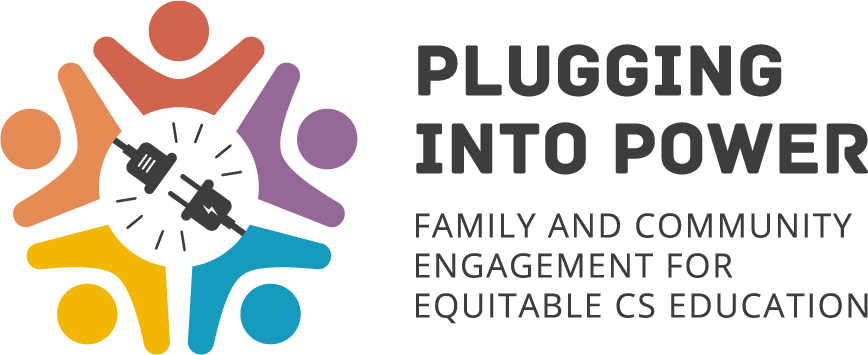
Plugging into Power: Family and Community Engagement for Equitable CS Education is a research project focused on building the capacity of community-based organizations in California serving parents, students, and low-income families of color to advocate for equity in computer science education. Parents and students, especially Black, Latinx, Native American, rural, and low-income students, can provide the much-need pressure to ensure meaningful, on-the-ground monitoring of the implementation of such policies and holding the system accountable to provide the necessary resources and support to ensure high-quality computer science education is sustainable in the long-term. The CS Equity Project researchers Julie Flapan, Jean Ryoo, Roxana Hadad, and Paula Nazario were awarded a grant from the Siegel Family Endowment to work with parents, caregivers, and students to 1) understand what they already know and think about the value of learning computer science in schools; 2) articulate what families/communities want their schools, administrators, and educators to do in regards to computer science education; and 3) build their capacity to increase demand at the local level for high-quality computer science access toward improved success for college, careers, and civic participation. The CS Equity Project is collaborating with Dr. Nicol R. Howard from the University of Redlands and her team at the Race in Education Analytics Learning Lab (REAL Lab) through the Google Computer Science Education Research (CS-ER) grant. This project is also made possible with generous support from the Siegel Family Endowment.
In California, our team member Dr. Julie Flapan is the Executive Director of ACCESS (Alliance of California Computing Education for Students and Schools). ACCESS is a statewide network of computer science education leaders including: K-12 teachers, administrators and leaders; computer science professors from community colleges through universities; education school faculty and CS professional developers; industry professionals; and educational policy advocates. ACCESS is dedicated to advocating for high-quality K-12 computer science education in California and ensuring its accessibility to all students, specifically targeting underrepresented students including girls, students of color and low-income students. To learn more, please visit: http://access-ca.org.
COLLABORATIONS
Exploring Computer Science is a 1-year, college-preparatory high-school course that exposes students to the breadth of computer science. ECS was written by team members Joanna Goode and Gail Chapman, and was first piloted in 2008 through a partnership between UCLA and the Los Angeles Unified School District (LAUSD). It has since spread to 25 states in the US, the 7 largest school districts in the nation, and Puerto Rico. Currently, the course reaches over 50,000 students annually. As of 2018, the ECS national expansion and program development work is being led by our collaborators at the University of Oregon. Visit the Exploring Computer Science project website to learn more about the ECS program, please contact Joanna Goode and Gail Chapman through the ECS site: www.exploringcs.org.
Check out our sister project: Introduction to Data Science, a high school course that helps students learn to reason with and think critically about data in all forms.
Contact the UCLA Computer Science Equity Project
Julie Flapan, Director
flapan@gseis.ucla.edu
The UCLA CS Equity Project stands in solidarity with the #BlackLivesMatter protests of the murder of George Floyd and all other Black men and women who have been victims of police violence. We decry the dehumanization that Black communities and low-income communities of color endure through inequitable access to education, health, employment, and housing resources. Our work in computer science education will continue to challenge historical systemic racism, inequality, and injustice. We commit to research and taking action against inequitable educational practices and policies and we will continue to amplify the voices, perspectives, and experiences of historically marginalized students of color.
